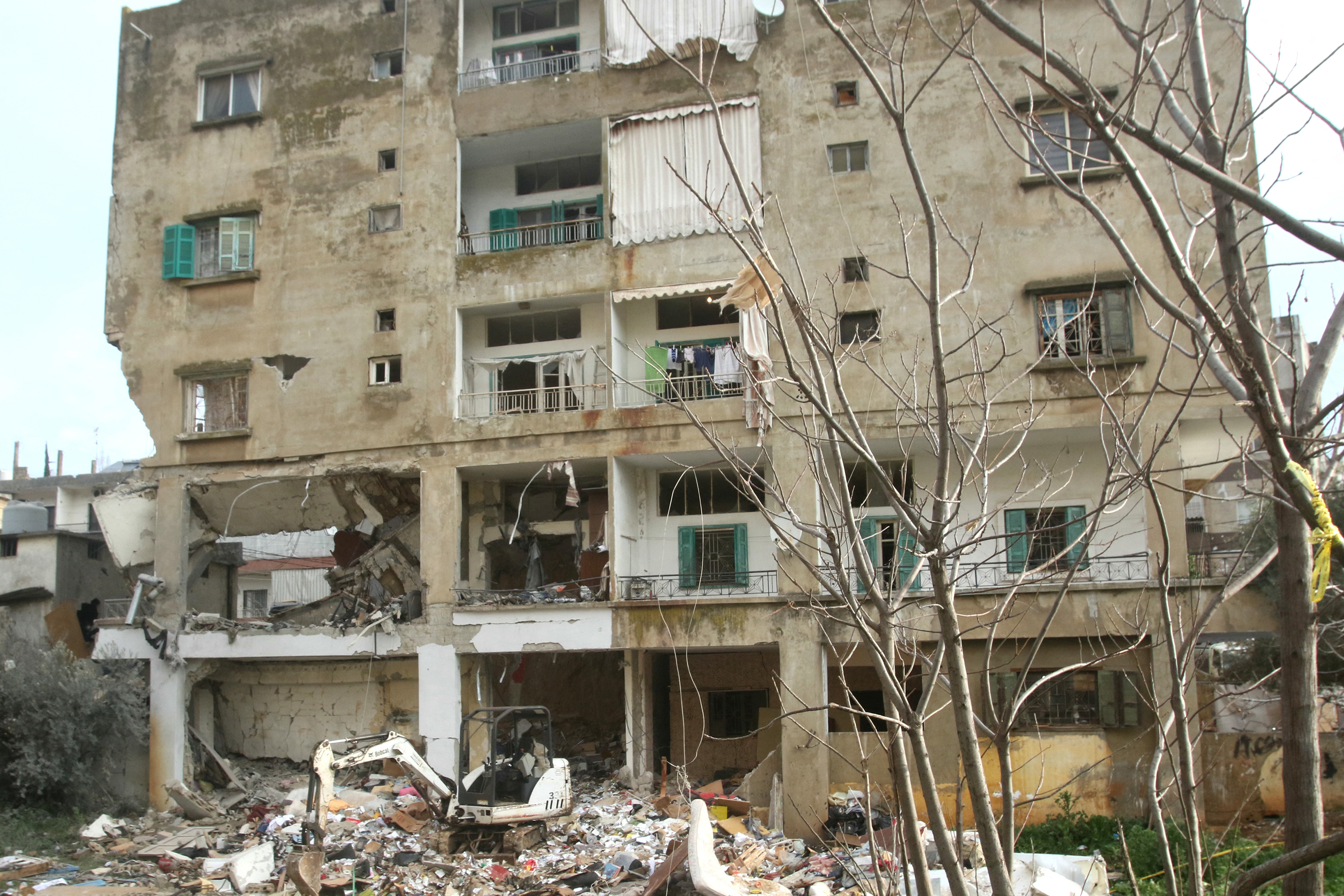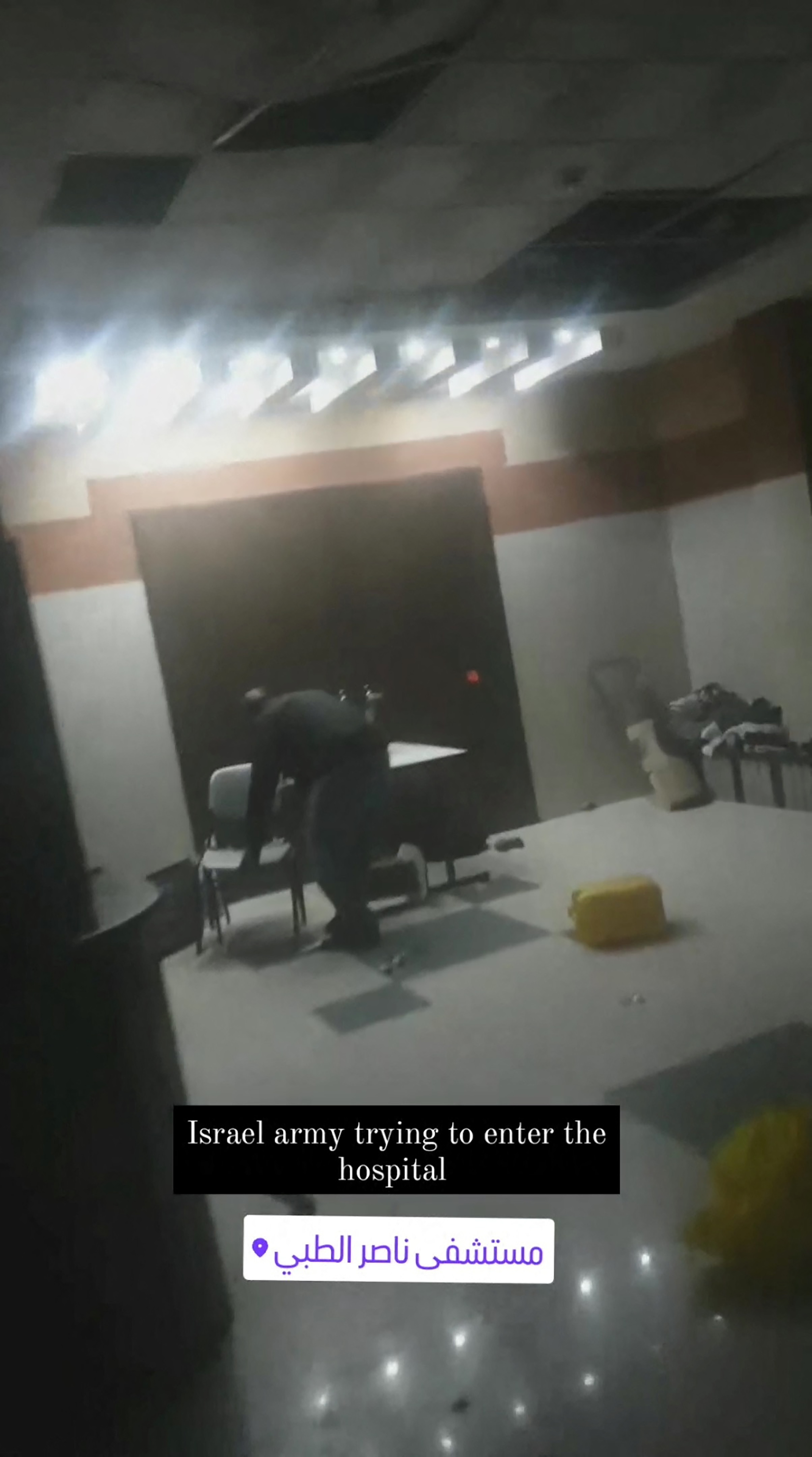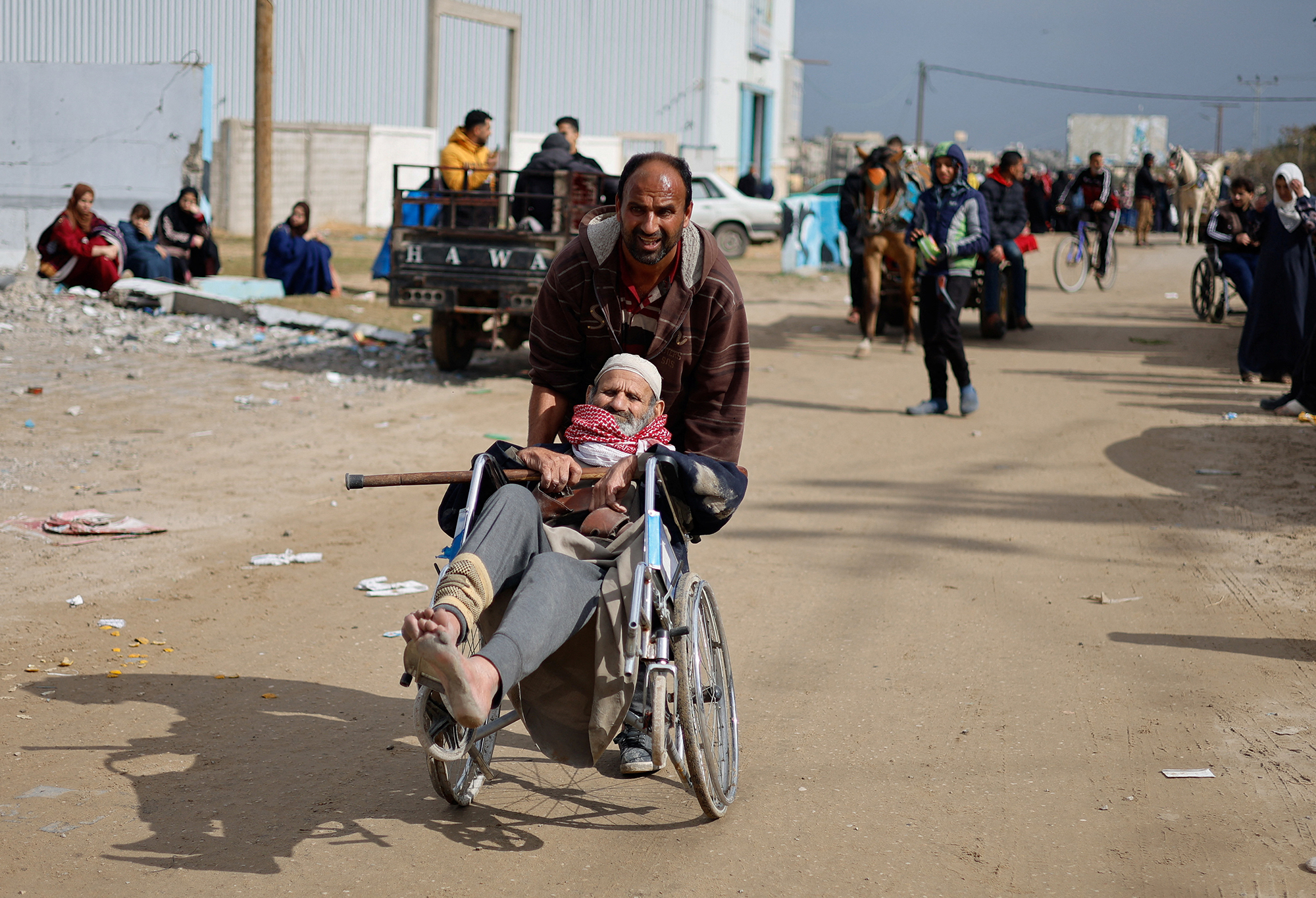On February 15, 2024, Israeli forces stormed the main hospital in southern Gaza. The raid was a limited operation seeking the remains of hostages taken by Hamas. According to medical staff and patients evacuated from Nasser Hospital in Khan Younis, Israel had previously bombed the facility's compound and injured six people during its attack on February 15th.
Israeli Forces Raid Gaza Hospital in Search of Hostage Remains, Injuring Six People During Attack
Israeli forces raided the main hospital in southern Gaza on February 15, 2024
Six people were injured during the attack at Nasser Hospital in Khan Younis
The raid was a limited operation seeking hostage remains taken by Hamas









Confidence
100%
No Doubts Found At Time Of Publication
Sources
85%
Israeli forces storm the main hospital in southern Gaza, saying hostages were likely held there
The Associated Press News Thursday, 15 February 2024 07:36Unique Points
None Found At Time Of Publication
Accuracy
- Israeli forces stormed the main hospital in southern Gaza on Thursday
- The Israeli army said it was a limited operation seeking the remains of hostages taken by Hamas
- A released hostage told The Associated Press last month that she and over two dozen other captives had been held in Nasser Hospital
Deception (80%)
The article is deceptive in several ways. Firstly, the Israeli army claims that it was seeking the remains of hostages taken by Hamas at Nasser Hospital. However, there is no evidence to support this claim and it seems like a pretext for an attack on a civilian facility. Secondly, Israel has been accused of using hospitals as military targets in previous conflicts and this practice continues with the current operation in Gaza. The article also reports that Hamas uses medical facilities for military purposes which further undermines their credibility when accusing Israel of doing the same. Lastly, there is no mention of any independent sources to verify the claims made by both sides.- The Israeli army's claim that it was seeking hostages at Nasser Hospital has not been substantiated and seems like a pretext for an attack on a civilian facility.
Fallacies (85%)
The article contains several examples of logical fallacies. The author uses an appeal to authority by stating that the Israeli army has credible intelligence about Hamas holding hostages at Nasser Hospital. This statement is not supported with any evidence and therefore cannot be considered a factual assertion.- Israel accuses Hamas of using hospitals and other civilian structures to shield its fighters.
Bias (100%)
None Found At Time Of Publication
Site Conflicts Of Interest (100%)
None Found At Time Of Publication
Author Conflicts Of Interest (0%)
None Found At Time Of Publication
59%
Live updates: Israel-Hamas war, Israeli jets strike Lebanon after rocket fire
CNN News Site: In-Depth Reporting and Analysis with Some Financial Conflicts and Sensational Language Chris Lau, Thursday, 15 February 2024 05:00Unique Points
None Found At Time Of Publication
Accuracy
- Israeli Prime Minister Benjamin Netanyahu's office has rejected any discussion about a Palestinian state at the moment.
- The Israeli army said it was a limited operation seeking the remains of hostages taken by Hamas.
Deception (50%)
The article contains a statement from Israeli Prime Minister Benjamin Netanyahu's office that rejects any discussion about a Palestinian state at this time. This is an example of deceptive language as it implies that the two-state solution is not being considered when in fact there are ongoing discussions about it.- The Washington Post on Wednesday reported that the Biden Administration and 'a small group of Middle East partners' are working to formulate a comprehensive peace plan, which could be announced as early as the next several weeks.
- A spokesperson in Prime Minister Benjamin Netanyahu's office on Thursday has rejected any discussion, for the moment, about a Palestinian state.
Fallacies (85%)
The article contains an appeal to authority fallacy when it quotes Avi Hyman, spokesperson for the National Public Diplomacy Directorate in the Israeli Prime Minister's Office. The quote is presented as a definitive statement and not just one person's opinion.- >Avi Hyman, spokesperson for the National Public Diplomacy Directorate in the Israeli Prime Minister’s Office on Thursday has rejected any discussion, for the moment, about a Palestinian state. <
Bias (85%)
The article contains examples of religious bias and monetary bias. The author uses language that depicts one side as extreme or unreasonable.- > A spokesperson in Prime Minister Benjamin Netanyahu's office on Thursday has rejected any discussion, for the moment, about a Palestinian state. <br> > CNN had asked Hyman about reporting by The Washington Post that the Biden Administration and 'a small group of Middle East partners' are working to formulate a comprehensive peace plan, which could be announced as early as the next several weeks.<br> > Here is Israel, we're still in the aftermath of the October 7th massacre,<br> > <b>Now is not the time for gifts for the Palestinian people</b>, Hyman said.
- Israeli politicians have publicly rejected a purported plan to provide a pathway for a Palestinian state.
Site Conflicts Of Interest (50%)
The authors of the article have a conflict of interest on several topics related to Israel and Palestine. The author Chris Lau is affiliated with National Public Diplomacy Directorate in Israeli Prime Minister's Office which has an interest in promoting Israel's image abroad. Additionally, Sophie Tanno and Antoinette Radford are also associated with CNN, a news organization that has been criticized for its coverage of the Israeli-Palestinian conflict.- Chris Lau is affiliated with National Public Diplomacy Directorate in Israeli Prime Minister's Office which has an interest in promoting Israel's image abroad.
- Sophie Tanno and Antoinette Radford are also associated with CNN, a news organization that has been criticized for its coverage of the Israeli-Palestinian conflict.
Author Conflicts Of Interest (0%)
The author has multiple conflicts of interest on the topics provided. The National Public Diplomacy Directorate in the Israeli Prime Minister's Office is a government agency and therefore may have political biases that could affect their reporting. Additionally, Avi Hyman is an advisor to Netanyahu, which creates a conflict of interest as he has personal ties with someone who is being reported on.- Avi Hyman is an advisor to Netanyahu, which creates a conflict of interest as he has personal ties with someone who is being reported on.
- The National Public Diplomacy Directorate in the Israeli Prime Minister's Office may have political biases that could affect their reporting. For example, they may be more likely to report positively on Israel and its actions during the conflict with Hamas.
81%
Israeli special forces raid last major hospital in southern Gaza
The Independent Chris Stevenson Thursday, 15 February 2024 12:25Unique Points
- Israeli special forces raided Nasser Hospital in Khan Younis, Gaza
- The hospital was used by Hamas to hide hostages and store bodies of hostages according to medical staff
- Six patients were injured and one killed during the raid
- Doctor Khaled al-Serr said Israeli military bombed the hospital compound, injuring six patients and killing one doctor
Accuracy
No Contradictions at Time Of Publication
Deception (80%)
The article is deceptive in several ways. Firstly, the Israeli military claims that it raided Nasser Hospital to find Hamas militants and hostages but there is no evidence of this. Secondly, the use of drones and bulldozers inside a hospital complex raises concerns about civilian casualties. Thirdly, Israel has consistently accused Hamas of using hospitals for shelter which medical staff have denied.- The Israeli military claims that it raided Nasser Hospital to find Hamas militants and hostages but there is no evidence of this.
Fallacies (85%)
The article contains several fallacies. The author uses an appeal to authority by stating that Israel's military described its raid on Nasser Hospital as 'precise and limited'. However, this statement is not supported with any evidence or credible information. Additionally, the author quotes a surgeon who claims that Israeli bulldozers were inside the hospital complex after all patients had been evacuated at gun point. This contradicts Israel's military spokesperson Rear Admiral Daniel Hagari's statement that there would be no need to forcibly evacuate remaning medics or patients. The author also uses inflammatory rhetoric by stating that the situation in the hospital is 'in chaos', and quotes a surgeon who claims that Israeli drones sound like buzzing insects in the background while he speaks. This creates an emotional response rather than providing factual information.- The author uses an appeal to authority when they state that Israel's military described its raid on Nasser Hospital as 'precise and limited'.
- The author quotes a surgeon who claims that Israeli bulldozers were inside the hospital complex after all patients had been evacuated at gun point. This contradicts Israel's military spokesperson Rear Admiral Daniel Hagari's statement.
- The author uses inflammatory rhetoric when they state that the situation in the hospital is 'in chaos'.
- The author quotes a surgeon who claims that Israeli drones sound like buzzing insects in the background while he speaks.
Bias (85%)
The article reports on the Israeli military's raid of Nasser Hospital in Khan Younis, Gaza. The author claims that Hamas was hiding in the hospital and had kept hostages there. However, medical staff have denied this claim. The article also mentions that Israel has consistently accused Hamas of using hospitals to hide and that it seeks to avoid civilian casualties by not targeting hospitals with airstrikes.- Israel's military described its raid on Nasser Hospital in Khan Younis as "precise and limited"
- The Israeli military said one objective of the operation was to ensure the hospital could continue treating Gazan patients
Site Conflicts Of Interest (100%)
None Found At Time Of Publication
Author Conflicts Of Interest (50%)
The author has a conflict of interest on the topic of Israel and Gaza. The article reports that Israeli special forces raided Nasser Hospital in Khan Younis, which is located in the Gaza Strip. This could be seen as an attack on medical staff and patients who are innocent bystanders caught up in a political conflict between Israel and Hamas.- Israeli special forces raid last major hospital in southern Gaza
- Nasser Hospital is located in the Gaza Strip
76%
Senior Hezbollah commander said among dead in IDF strikes on southern Lebanon
The Times of Israel Thursday, 15 February 2024 13:20Unique Points
None Found At Time Of Publication
Accuracy
- Israeli forces stormed Nasser Hospital in Khan Younis, Gaza.
- The Israeli army ordered occupants of the hospital to evacuate before entering.
Deception (50%)
The article contains several examples of deception. Firstly, the headline claims that a Hezbollah commander was among those killed in an Israeli strike in Lebanon when it is not clear if he was actually targeted or just happened to be near the site of the attack. Secondly, there are conflicting reports about who this commander is and what his role within Hezbollah was. The article claims that he had previously been wounded by Israel but also identifies him as a Palestinian affairs expert which contradicts previous statements made in other articles. Thirdly, there is no evidence to support the claim that Hamas has used Gaza's civilian population as human shields during their attacks on northern Israel.- The article claims that a Palestinian affairs expert named Ali Muhammad al-Debes, 48, from Zebdine was killed in an Israeli strike. However, previous articles identified him as Abbas al-Debes which contradicts the information provided in this article.
- The headline claims that a Hezbollah commander was among those killed in an Israeli strike in Lebanon when it is not clear if he was actually targeted or just happened to be near the site of the attack. This statement is misleading and deceptive as there are conflicting reports about who this commander is and what his role within Hezbollah was.
Fallacies (85%)
The article contains several examples of informal fallacies. The author uses inflammatory rhetoric when describing the death toll from Israeli strikes in Lebanon and Gaza as a 'massacre' and a 'war crime'. This is an example of hyperbole, which is not supported by evidence. Additionally, the author makes an appeal to authority by citing Richard Kozul-Wright without providing any context or explanation for his position on the issue. This could be seen as biased reporting. Finally, there are several instances where the author uses dichotomous depictions of Israel and Hamas when describing their actions in Gaza and Lebanon respectively.- The death toll from Israeli strikes in Lebanon is a 'massacre' and a 'war crime'
- Richard Kozul-Wright, director at the UN trade body (UNCTAD), says that the damage was already four times the damage endured in Gaza during the seven-week war in 2014.
- The Hezbollah terror group names three members killed 'on the road to Jerusalem' their term for operatives slain in Israeli strikes.
Bias (85%)
The article contains a statement that is biased towards Israel. The author of the article identifies one of the Hezbollah commanders killed in an Israeli strike as Ali Muhammad al-Debes and states that he was responsible for Palestinian affairs in Hezbollah. However, this information contradicts previous reports where he was identified as Abbas al-Debes. The author also uses language such as 'on the road to Jerusalem' which is a term used by Israelis to describe their actions against Hamas and implies that they are acting justly.- ]The Hezbollah terror group names three members killed "on the road to Jerusalem," its term for operatives slain in Israeli strikes. They are named as Ali Muhammad al-Debes, 48, from Zebdine, Hassan Ibrahim Issa, 27, from Houmine el-Tahta, and Hussein Ahmad Aqeel,
Site Conflicts Of Interest (100%)
None Found At Time Of Publication
Author Conflicts Of Interest (0%)
None Found At Time Of Publication
76%
Israel’s war on Gaza live: Israeli forces storm besieged Gaza hospital
Al Jazeera Media Network Urooba Jamal, Thursday, 15 February 2024 13:21Unique Points
- Israeli forces stormed Nasser Hospital in Khan Younis, Gaza.
- The Israeli army ordered occupants of the hospital to evacuate before entering.
- Rafah exodus began as Israel's military stepped up air raids and artillery fire before a feared ground operation on the southern city once designated a 'safe zone'.
Accuracy
No Contradictions at Time Of Publication
Deception (30%)
The article is deceptive in several ways. Firstly, the title of the article implies that Israeli forces are storming a hospital in Gaza when in fact they are entering Nasser Hospital after ordering occupants to evacuate. This misrepresents what is happening and creates an emotional response for readers who may believe innocent people are being attacked by Israelis without any context or explanation. Secondly, the article uses sensationalist language such as 'waiting to be martyred' and 'being starved', which exaggerates the situation in Gaza and implies that Israeli actions are causing widespread suffering when there is no evidence of this. Lastly, the article does not provide any context or background information on why Israel is conducting military operations in Gaza, making it difficult for readers to understand the motivations behind these actions.- Sensationalist language such as 'waiting to be martyred' and 'being starved' exaggerates the situation in Gaza and implies that Israeli actions are causing widespread suffering without any evidence of this.
- The title misrepresents what is happening at Nasser Hospital by implying that Israeli forces are storming a hospital in Gaza when they are actually entering after ordering occupants to evacuate.
- The article does not provide any context or background information on why Israel is conducting military operations in Gaza, making it difficult for readers to understand the motivations behind these actions.
Fallacies (80%)
The article contains several logical fallacies. The author uses an appeal to authority by citing the Israeli army's actions as evidence of their position on Gaza without providing any context or explanation for why this is relevant. Additionally, the use of inflammatory rhetoric such as 'waiting to be martyred' and 'being starved' are examples of emotional appeals that do not provide logical reasoning behind them.- Heavy tank and machine-gun fire as Israeli army enters Nasser Hospital in Khan Younis after ordering occupants to evacuate this morning.
Bias (85%)
The article contains multiple examples of bias. The author uses language that dehumanizes Palestinians and portrays them as helpless victims who are being martyred by the Israeli military. The use of phrases such as 'We're waiting to be martyred' and 'They're forcing us into islands' is inflammatory and not objective reporting. Additionally, the article uses quotes from Palestinians that are heavily edited or taken out of context to make them appear more extreme than they actually are.- They’re forcing us into islands
- We’re waiting to be martyred
Site Conflicts Of Interest (100%)
None Found At Time Of Publication
Author Conflicts Of Interest (100%)
None Found At Time Of Publication